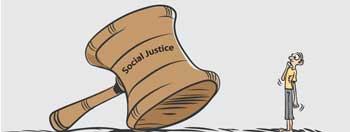04 Jan 2024 - {{hitsCtrl.values.hits}}
 “Let us build a just and fair society” was the New Year wish of our sister paper Sunday Times. Unfortunately, most people, most of the time, do not work towards this vision but instead are selfish and self-centred. Therefore, we prefer to get rather than to give, to obtain wealth, possessions and positions. Spirituality tells us that it is more blessed to give than to get. Freely as we receive, freely we must give. Our care for the other is a measure of our greatness.
“Let us build a just and fair society” was the New Year wish of our sister paper Sunday Times. Unfortunately, most people, most of the time, do not work towards this vision but instead are selfish and self-centred. Therefore, we prefer to get rather than to give, to obtain wealth, possessions and positions. Spirituality tells us that it is more blessed to give than to get. Freely as we receive, freely we must give. Our care for the other is a measure of our greatness.
A just and fair society also requires dialogue and peace, as the widely-loved St. Francis of Assisi wrote: “Make me a channel of your peace, where there is hatred let me bring your love, where there is injury, your pardon Lord, and where there is doubt true faith in You: Make me a channel of your peace, where there is despair in life let me bring hope, where there is darkness only light, and where there’s sadness ever joy: Oh, Master grant that I may never seek, so much to be consoled as to console, to be understood as to understand, to be loved as to love with all my soul”
It is a beautiful and inspiring song but we need practise it so that there will be social justice. Political leaders especially need to practise it because most of the time most of them do not practise what they preach.
Next month, the United Nations marks the World Day of Social Justice with the theme being “Overcoming Barriers and Unleashing Opportunities for Social Justice”. In a statement, the world body said that the theme focuses on the recommendations of our common agenda to strengthen global solidarity and to re-build trust in governments by “overcoming barriers and unleashing opportunities for Social Justice”. Therefore, the day provides an opportunity to foster dialogue with Member States, youths, social partners, civil society, UN organisations and other stakeholders on actions needed to strengthen the social contract that has been fractured by rising inequalities, conflicts and weakened institutions that are meant to protect the rights of workers. Despite these multiple crises, there are many opportunities to build a coalition for social justice and to unleash greater investments in decent jobs, with a particular focus on the green, digital and care economy, and on young people.
Explaining a “coalition for social justice”, the UN says, poverty and inequalities within and among countries are on the rise in many parts of the world. The economic and social crises of recent years have been exacerbated by the consequences of the COVID-19 pandemic, natural disasters due to accelerating climate change, geopolitical tensions and armed conflicts. Beyond the human tragedies associated with them and their impact on the world of work, these crises have highlighted the inter linkages and dependencies of economies and societies around the world and shown the crucial need for concerted action to respond to them, at global, regional and national levels.
This has happened against the background of important changes such as, inter alia, growing disruptions in economies linked to globalization and technology, significant demographic transformations, increasing migration flows and protracted situations of fragility. The world of work has not been spared by these upheavals. The perceived lack of satisfactory responses to these multiple challenges and changes has led many countries to growing discontent and mistrust vis-à-vis established institutions and actors of public life.
Confronted with this complex situation, the multilateral system has also struggled to adapt to a changing environment and to provide concrete and coordinated responses to many of the world’s most pressing challenges. The growing gap between international commitments and concrete achievements has fragilised multilateral action and its credibility, resulting in open criticism and disengagement. More than ever, it is urgent for the multilateral system to deliver and to contribute to bringing solutions to people’s daily problems, and to do so in a more efficient and coherent manner, the UN says.
American author, disability rights advocate, political activist and lecturer, Helen Keller says, “Until the great mass of the people shall be filled with the sense of responsibility for each other’s welfare, social justice can never be attained”. She lost her sight and her hearing after a bout of illness when she was 19 months old. One of the world’s greatest statesmen Nelson Mandel says, “Millions of people in the world’s poorest countries remain imprisoned, enslaved, and in chains. They are trapped in the prison of poverty. It is time to set them free.”
25 Nov 2024 27 minute ago
25 Nov 2024 1 hours ago
25 Nov 2024 2 hours ago
25 Nov 2024 2 hours ago
25 Nov 2024 2 hours ago